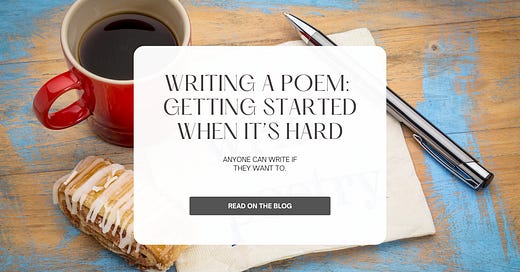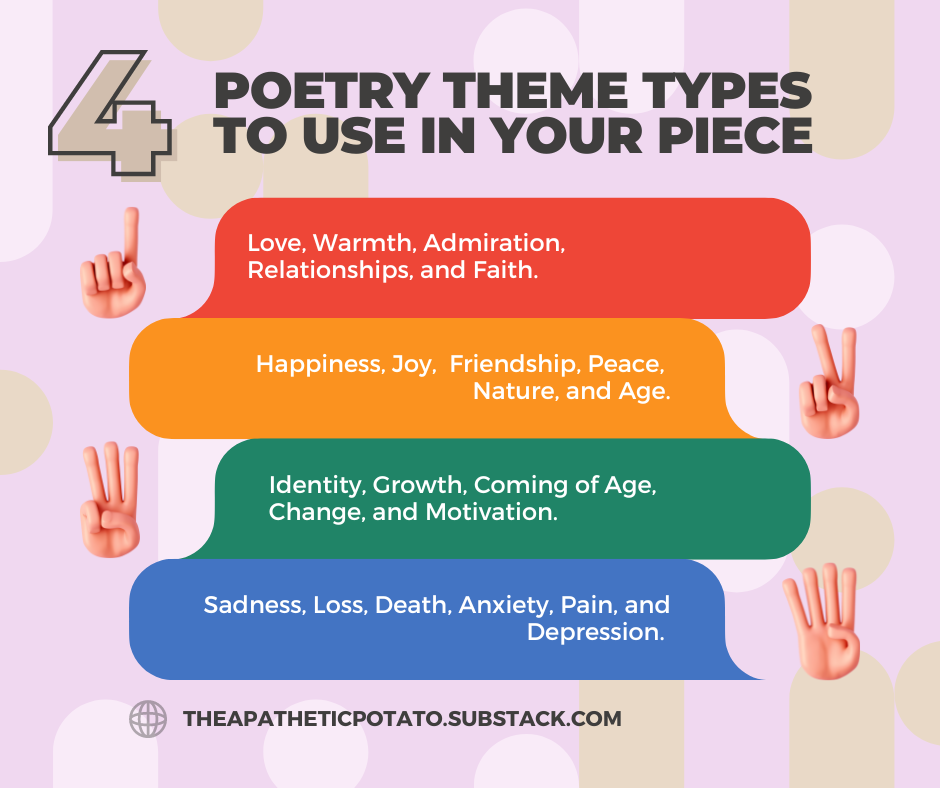Writing A Poem: Getting Started When It's Hard.
Writing poetry can be hard, but anyone can do so if they really want to. Let's learn how to get started together!
I was reading messages from a group chat the other day, when I noticed many people were talking about how hard Poetry was to write. I always felt the opposite, finding poetry easier to contemplate and form. Though, I do suppose, such as being a novelist is an art of its own, so is being a poet.
You could say the same for any hobby or project you work on, too. Some people find knitting easier than writing. Others find graphic design easier than sewing. There are so many things to become better at. And not everyone has the time for them. But what if you did have the time to learn poetry? Where would you start?
Well, here, if you’re reading this blog-post. I’ve written poetry for years, and while I’m not perfect, I’d love to share some of my knowledge with you. Let me take you from the beginning to the next steps, and what you can expect from learning this craft. Come on, let’s hop in together!
The Brainstorm: Where are the Ideas?

A lot of the focus on writing a poem is following structure. When you read poetry, you often see the best of their work. Whether that is a freely written piece, or something more complicated like a sonnet, ballad, or haiku. Those might not sound complicated, but finding ways to make them work absolutely can be.
But when you’re new, the structure isn’t that important. Yes, you’ll still need to pick one when you’re actually writing the poem. But it’s not something to worry about quite yet.
First, let’s find some ideas for the poem. What messages are you wanting to convey? What is the theme? Do you want the poem to be sad, or maybe happy? Focus on that, and shape it in your mind. You can also use the graphic below to get ideas.
Once you’ve chosen, it’s time to decide the other components of the poem. Do you want the poem to be emotional, relying heavier on the feelings rather than details? Or would you prefer something more grounded, tied to experiences, either personal or conceptual?
For me, I prefer the latter, and I think most people do. Although, there’s no shame in writing something emphasized on emotion. After all, it helps you to write when you don’t know where to start. It aided me in my beginnings as a writer, too. But, it’s not the goal with being a poet.
Make sure as you’re coming up with ideas for your poem, to think of what’s in the poem itself. Are there any other characters in it, or is it solely about yourself? Where is the poem located, and how does that affect the course of the piece? Spend as much time as you need to form those ideas.
There’s never any shame in taking awhile to brainstorm.
So, We Have Our Ideas: Let’s Get Started.
You’ve chosen your ideas for your poem, and now it’s time to get started on writing it. But how are you going to do that? You’re going to have to pick a structure for the poem, but each form has its own rules. How is that going to affect your ability to write the piece?
When I first started writing poetry, I stuck with free-form; a writing style that doesn’t have rules or rhyming. In it, you’d decide the length of each line, stanza, and the entirety of the poem itself. I think this works well as you’re finding your footing.
You can take a look at this poem here for example:
Positivity
Wake up,
Get up,
Look around you,
What do you see?
Other people,
Moving forward,
Seemingly so distant.
You feel like you can't relate,
To them at all.
But maybe you,
Just don't realize,
They too,
Have their own struggles.
Everyone does.
Maybe it's time,
To move forth,
With a positive mindset,
And be the friend,
To others,
So you too,
Can become,
Not alone no more.
(2017)
You can see the core concepts of the poem as you read: everyone struggles, and you’re not alone. By all means, this piece is clear and consistent in its message. For something I wrote back when I was first starting out, I think it works well enough.
When you’re writing poetry, treat it the same as any art form. You’re not going to produce your best work starting out. But each piece is like a sketch, not perfect nor bad. It is something there to show you’re practicing, and therefore taking initiative to grow.

If you can accept your poetry isn’t going to be great, then you can accept that you’ll be able to grow. I’ve said this before, but to write is to never stop learning. And as a poet, you’re always going to be learning new things.
By no means do you have to start with free-form poetry, but I think it’s helpful to do so. If you decide to choose a different form, think carefully about which one will suit your poem best. And if you get stuck at all, don’t be afraid to read poetry from other writers.
That’s also good advice those writing free-form, too. Reading poetry is a great way to find inspiration for your work. It’ll also help you to learn new forms after you feel like you mastered the one you’re working on. Or, it’ll help you discover new things about that form you didn’t even realize you could do.
You’re Writing, and That’s Great, but What Else Should You Know?
Before we wrap up this post, let’s get a few more things out of the way. You’re writing now, and that’s great. But there’s a few things you should keep in mind as you do so.
A Thesaurus is your best friend: If you’re struggling to find synonyms that convey the meaning of the word you want to write down, using a thesaurus (either a book or online) works wonders. Just remember not to choose words you’d have a hard time pronouncing.
Read your poetry out loud: Admittedly this isn’t something I do much of, but it’s important, regardless. Poetry is a vocal craft, and is meant to be read out loud. Doing this can help you find the flow in your piece, and discover what works or doesn’t.
Connect with other writers: One of the best ways to grow as a poet is to share your work with others. Receiving constructive criticism helps you learn what areas you can improve as you write. One of my favorite places for this is Allpoetry - a website for poets made by poets.
Never stop practicing: Not every poem is going to be a masterpiece, but that doesn’t mean you should stop writing. If you ever feel stressed out, take a small break from it. But don’t stop practicing if you truly want to continue growing. To write is to never stop learning, after all.
Now that you’re on your way to growing as a writer and a poet, it’s time to get out there and start writing! There’s a lot of resources to utilize when writing, so make sure to subscribe to stay updated on more posts like this. And if you want to support my writing, (and perhaps your own), consider purchasing a copy of “Inside the Sun and Moon.” See you next time!






Never stop practicing, we are always learning. ALWAYS!